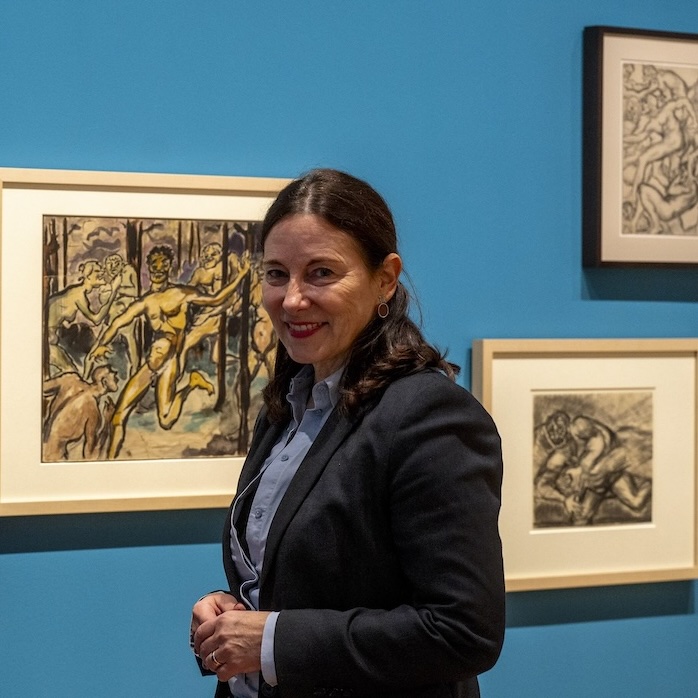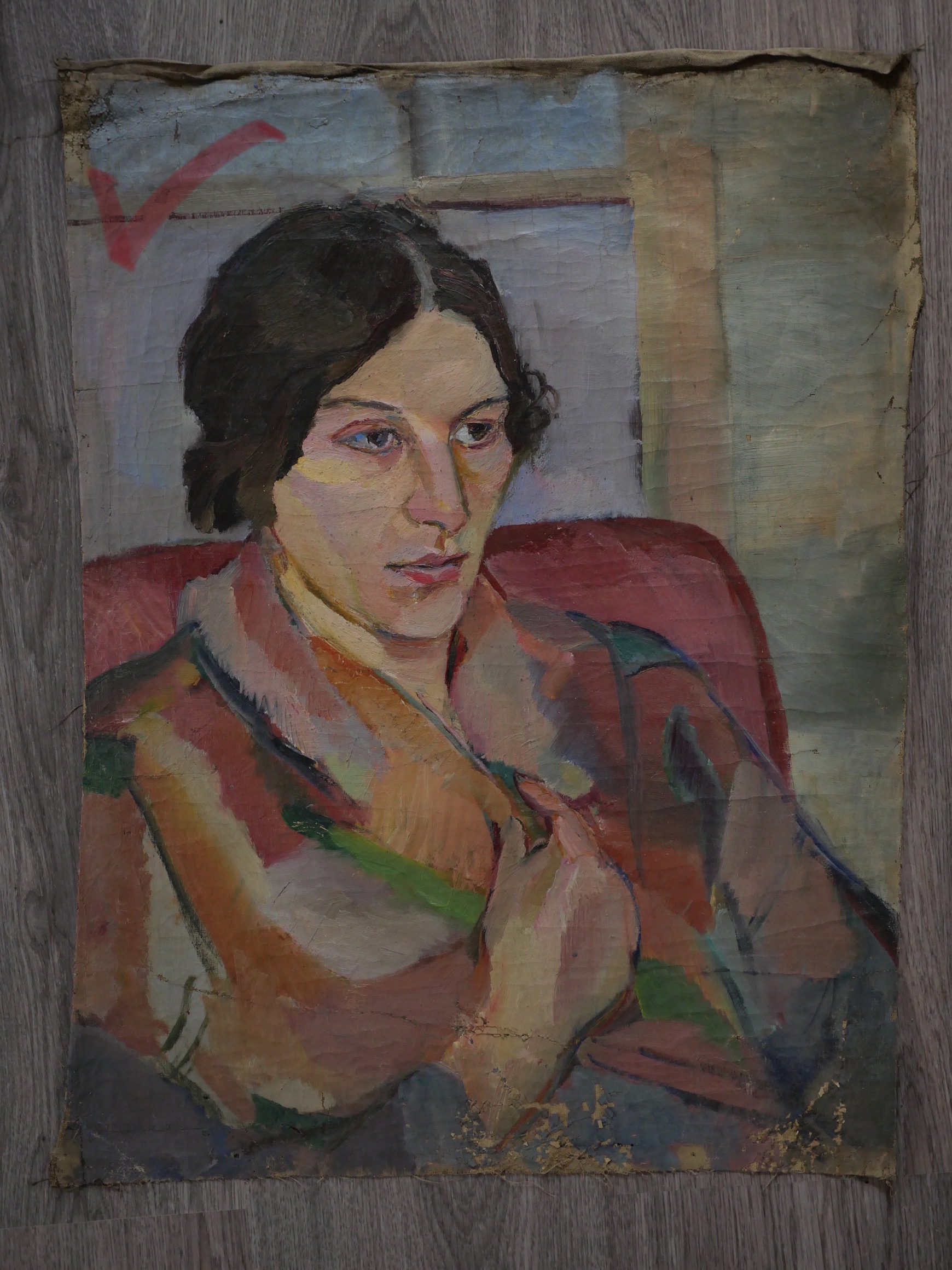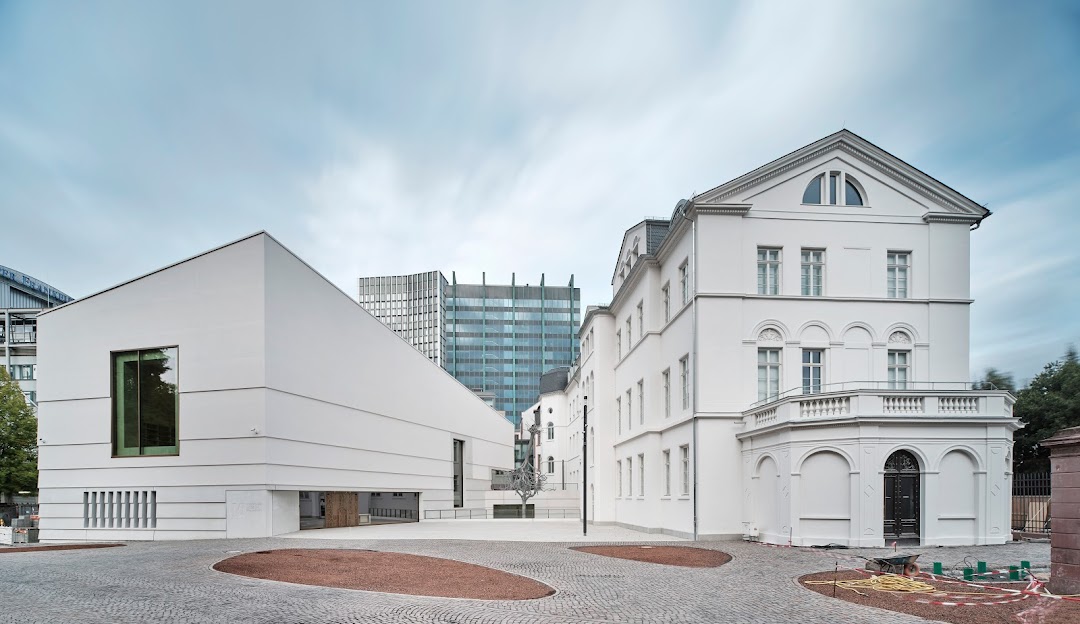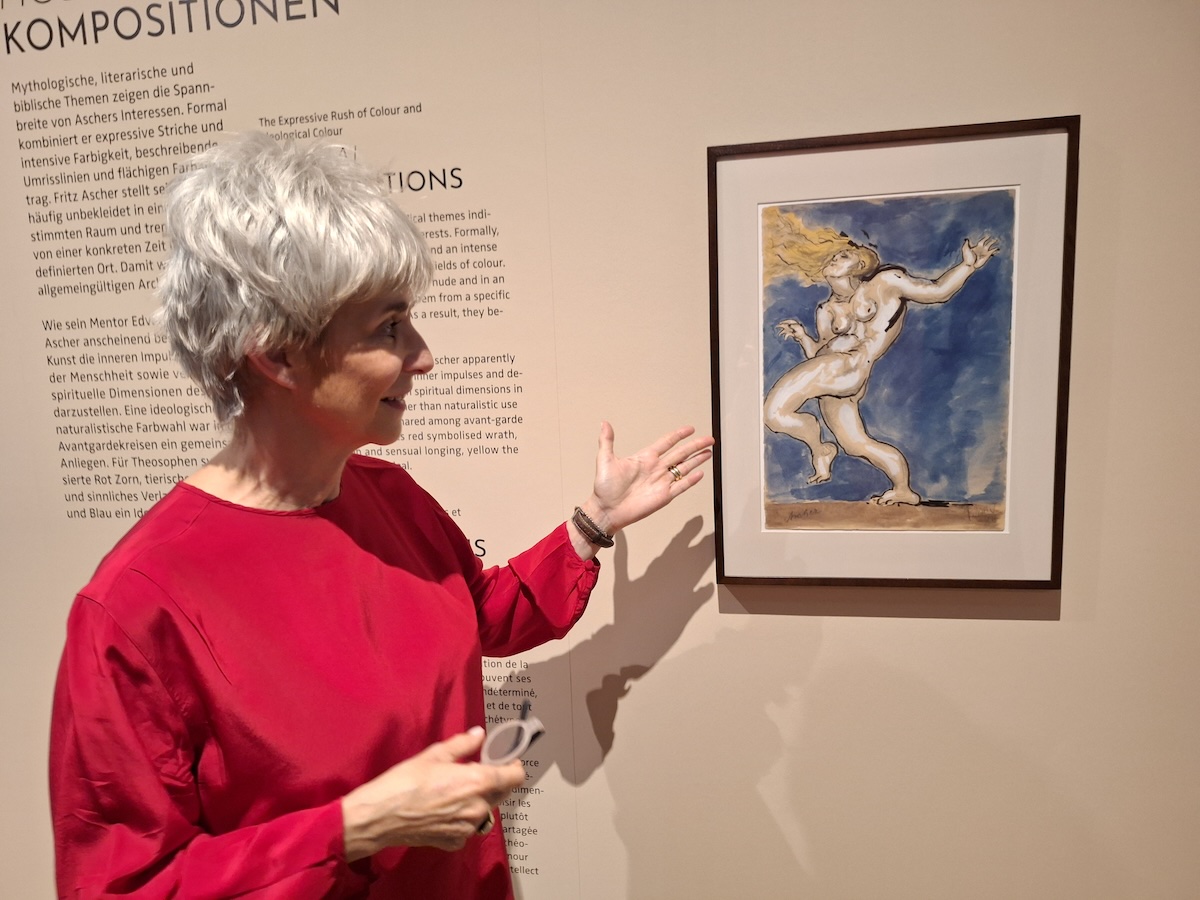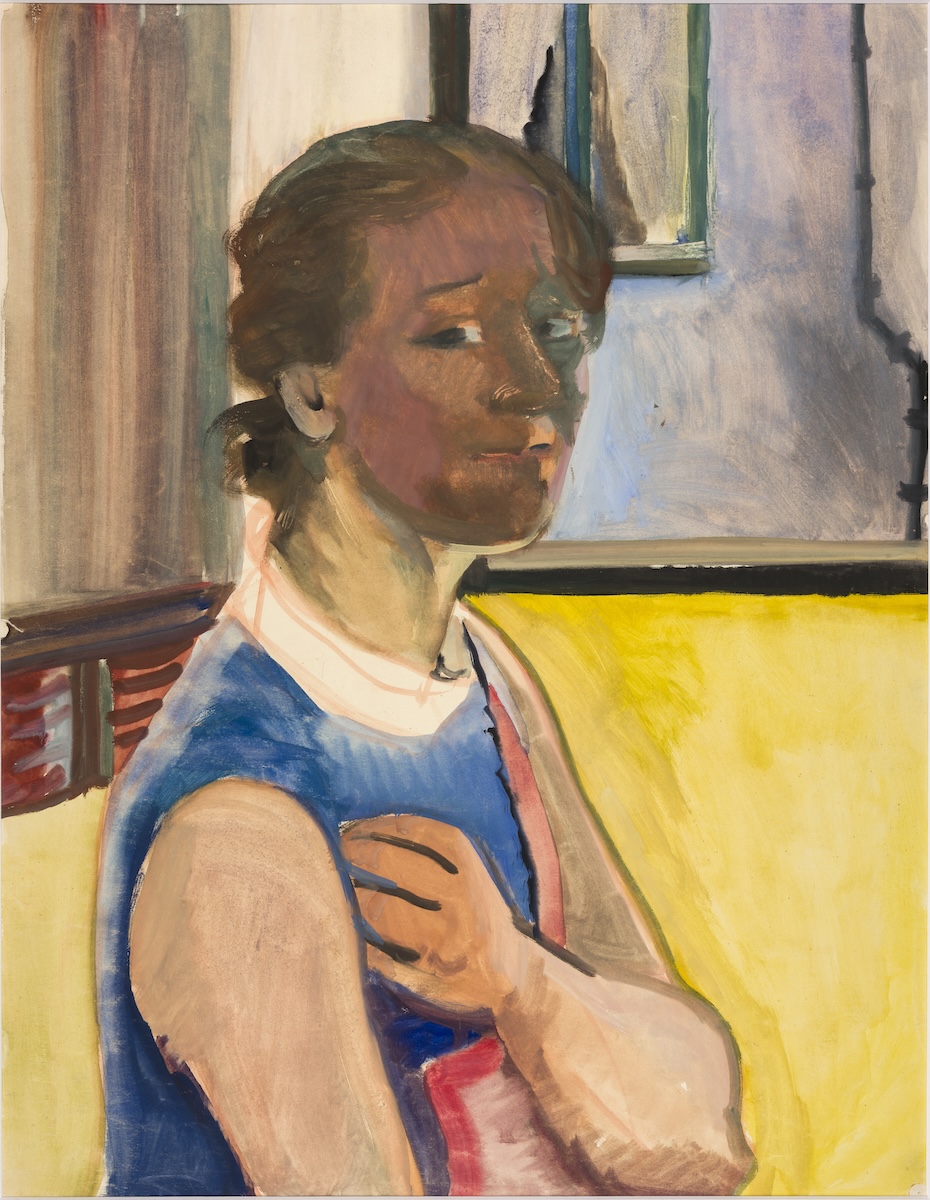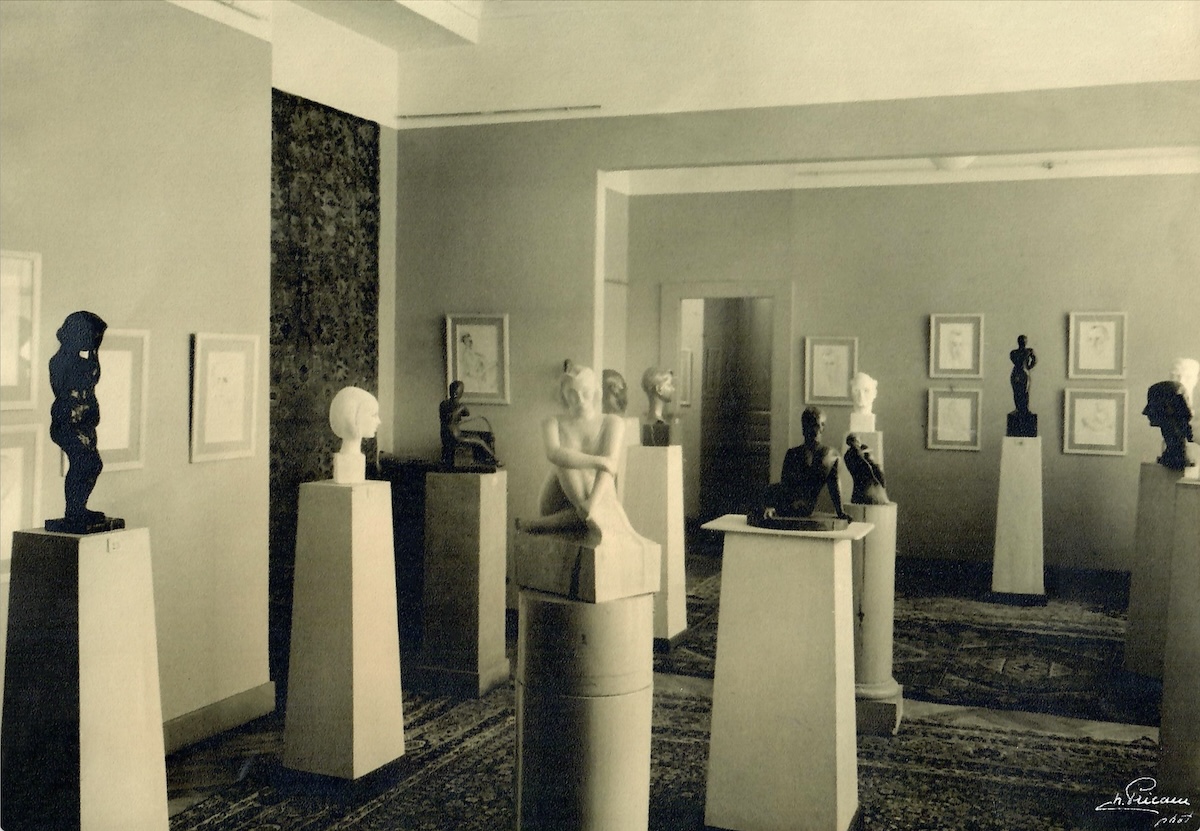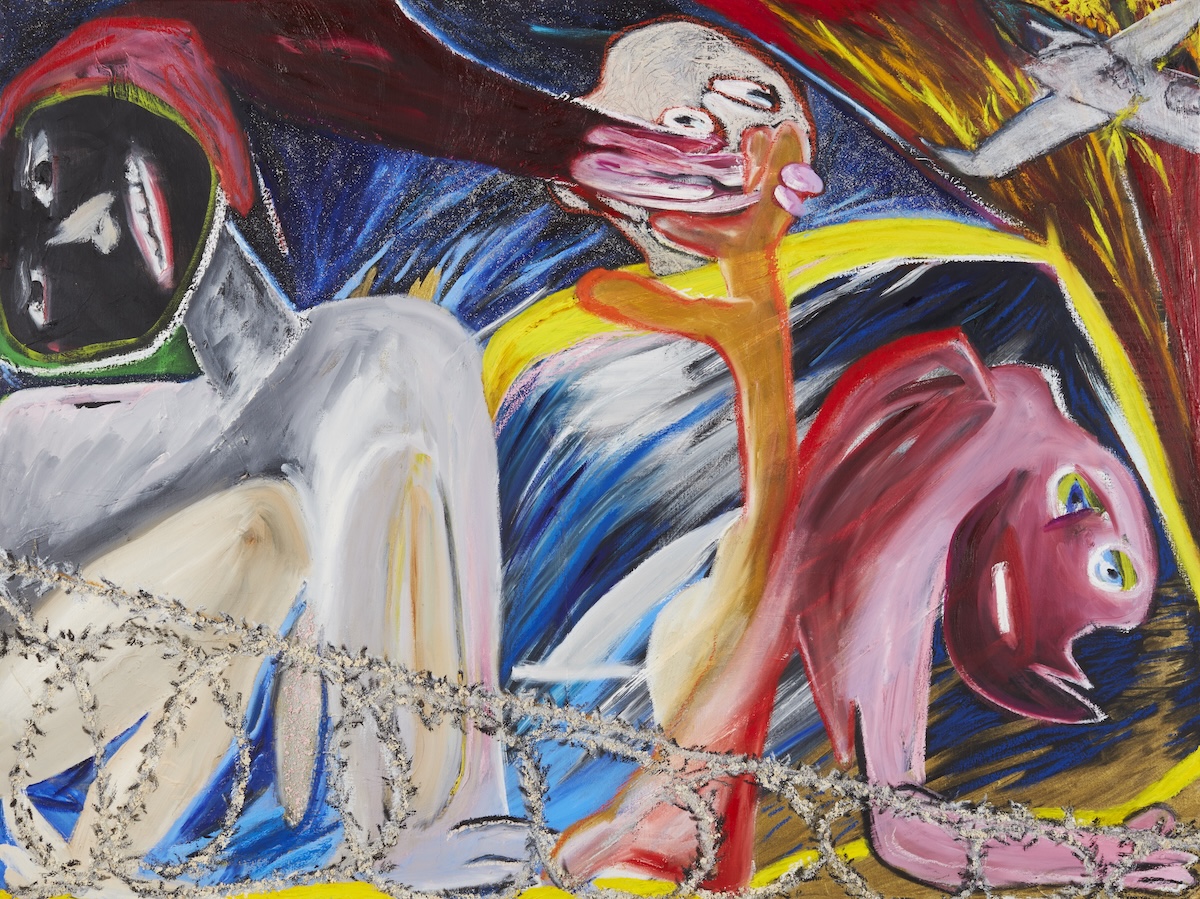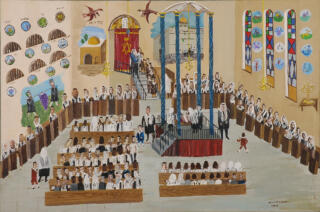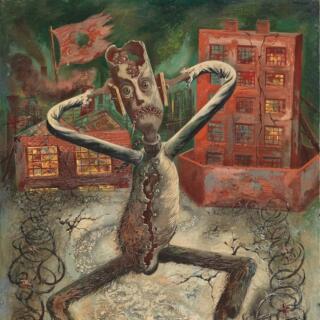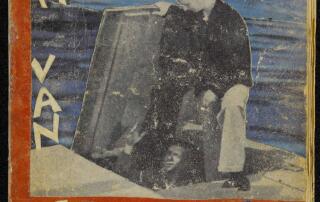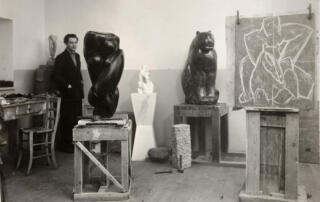Rachel Stern2025-04-01T11:50:07-04:00March 3rd, 2025|Events, Lectures, Memory, Past Events|
Join curator Ori Z Soltes, Rabbi Ronnie Cahana, and Kitra Cahana for a conversation about Survival and Intimations of Immortality: The Art of Alice Lok Cahana, Rabbi Ronnie Cahana, and Kitra Cahana. Image above: Alice Lok Cahana, 1940-44 Triptych: left panel, 1984. Collection Ronnie and Michael Cahana, Inv. 052 This unique and powerful exhibition at the Oregon Jewish Museum and Center for Holocaust Education explores the role of art and creativity, bringing the past into the present by focusing on three generations of artists from the same family. The artists and curatorial team will share their insights about the work in the exhibition, how the show was made, and the impact it had, and share [...]
Rachel Stern2024-12-18T05:55:27-05:00December 4th, 2024|Events, Lectures, Past Events|
Jutta Götzmann, exhibition curator of "Love and Betrayal," presents the artist Fritz Ascher (1893-1970) during a tour. In addition to early charcoal, graphite and ink drawings, colorful gouaches are fascinating. Poems that are considered his "unpainted pictures" and were created in secret during the National Socialist era complement the exhibition. BUY TICKETS HERE The Fritz Ascher Society is a not-for-profit 501(c)3 organization. Your donation is fully tax deductible. YOUR SUPPORT MAKES OUR WORK POSSIBLE. THANK YOU. DONATE HERE
Rachel Stern2024-12-05T06:58:15-05:00November 19th, 2024|Events, Lectures, Past Events|
While workmen were demolishing a house on Prague’s outskirts in July 2018 they were astonished to be deluged by works of art falling from a ceiling. Nobody knew the works had been hidden there. The art turned out to be that of Gertrud Kauders who had hidden them in the house of a friend before being deported to Theresienstadt and then to Majdanek where she was murdered on arrival in May 1942. Kauders was a serious and inventive artist, quite well known in Prague’s art world of the time. She worked in oils, pencil, crayon, watercolour and gouache. Now her work is held by museums around the world. Image above: Gertrud Kauders © Kauders Family Estate [...]
Rachel Stern2024-11-24T14:39:31-05:00October 28th, 2024|Events, Lectures, Past Events|
Der Maler, Grafiker und Dichter Fritz Ascher (1893-1970) wurde bereits als 16-Jähriger von Max Liebermann an die Akademie in Königsberg empfohlen. Ab 1913 gehörte er zu den gefragten Malern in Berlin. Er war ein genauer Beobachter seiner Zeit; die Urkatastrophe des Ersten Weltkriegs und die revolutionären Unruhen in Berlin führten ihn zu christlichen und mystischen Themen, die er radikal neu interpretierte. Nach 1933 erhielt Ascher als Jude Berufsverbot. Während der Pogrome am 9./10. November 1938 wurde er verhaftet und im Konzentrationslager Sachsenhausen und im Potsdamer Gestapo-Gefängnis interniert. Die Schoa überlebte er ab 1942 versteckt in einem Keller in Berlin-Grunewald. Während dieser einsamen Jahre verfasste er Gedichte. Als Künstler fand Ascher nach 1945 seinen ganz eigenen Stil. Angeregt vom nahe [...]
Rachel Stern2024-11-24T14:40:53-05:00October 22nd, 2024|Events, Lectures, Past Events|
Der spätexpressionistische Künstler Fritz Ascher (1893-1970) überlebte zwei Weltkriege und die Verfolgung durch das nationalsozialistische Regime. Als aufmerksamer Beobachter der Schrecken des Ersten Weltkriegs und der revolutionären Unruhen wandte er sich christlich-spirituellen Themen zu, die er radikal neu interpretierte. In intimen Zeichnungen beschäftigte er sich ab 1916 mit dem Thema Liebe und Verrat, sowohl in seiner Auseinandersetzung mit dem Kreuzigungsthema als auch mit der Figur des Bajazzo in der tragikomischen Oper „I Pagliacci“. Kurzvortrag und Führung von Rachel Stern zeigen den Künstler in seinem sozialen und politischen Umfeld. Image above: Fritz Ascher, Im Wald, um 1919. Weisse Gouache und schwarze Tusche über Aquarell und Bleistift auf Papier, 34 x 32,2 cm © Bianca Stock The late expressionist [...]
Rachel Stern2024-11-20T13:50:30-05:00October 11th, 2024|Events, Lectures, Past Events|
Felka Platek (1899 Warsaw – 1944 Auschwitz) came to Berlin from Warsaw in the early 1920s to become a painter. In 1932 she followed her friend and later husband Felix Nussbaum (1904 Osnabrück – 1944 Auschwitz) to Italy. In 1935 they decided to go into exile in Belgium. However, neither of them could escape persecution by the Nazis. They were captured in their hiding place in Brussels on June 21, 1944 and murdered in Auschwitz shortly afterwards. Image above: Felka Platek, Self-portrait in front of an open window, around 1940. Gouache on drawing paper, 65 x 49.7 cm. Felix-Nussbaum-Haus at Museumsquartier Osnabrück, on permanent loan from the Felix Nussbaum Foundation, photo © Felix-Nussbaum-Haus Osnabrück Anne [...]
Rachel Stern2024-10-23T13:54:17-04:00September 30th, 2024|Events, Lectures, Past Events|
This talk analyzes the Ukrainian born French sculptor Chana Orloff’s (1888-1968) perseverance and tremendous sacrifices during World War II, when the Nazis came to her studio, stole much of her work, and brutally vandalized what they left behind. Her tenacity led to her narrow and difficult escape from Paris first to the south of France and then on to Geneva with her young adult son, who was disabled. The presentation explores how Orloff managed her life and career under Nazi Occupation in Paris for two years, when she was among the many French and foreign-born Jews banned from public spaces, forced to observe a curfew and wear the yellow armband with the Star of David and the word “Juif” [...]
Rachel Stern2024-09-25T13:42:20-04:00September 1st, 2024|Events, Lectures, Past Events|
In this virtual talk, curator Ariella Wolens presents the late Dutch artist, Situationist, and Pataphysician Jacqueline de Jong (1939-2024). Born into a Jewish family in Enschede, Netherlands, De Jong’s infancy was spent in exile in Switzerland; she and her mother narrowly escaped deportation to Sobibor after being taken in by the resistance. For the rest of her life, she remained universally empathic, and chose art as her own form of resistance. Image above: Jacqueline de Jong, Naufrage en Mediterranée (Border Line), 2020. Oil and nepheline gel on canvas, 35 3/8 x 47 1/4 in / 90 x 120 cm. BPS22, Musée d'art de la Province de Hainaut, Belgium. Courtesy the artist’s estate and Ortuzar Projects, New York. © 2024 [...]
Rachel Stern2024-09-10T15:14:18-04:00July 4th, 2024|Events, Lectures, Past Events|
Lest future generations know more about how Jews died than how they lived, Mayer Kirshenblatt (1916-2009) made it his mission to remember the world of his childhood in images and words. Born in Opatów (Apt in Yiddish), Mayer left for Canada in 1934 at the age of 17. Image above: Mayer Kirshenblatt, Synagogue interior, 1991. Acrylic on canvas. Gift of the Kirshenblatt Family. Taube Family Mayer July Art Collection at POLIN Museum of the History of Polish Jews, Warsaw. He had always told his family stories about growing up in Poland before the Holocaust. After his family begged him to paint what he could remember, Mayer finally picked up his brush in 1989 at the [...]
Rachel Stern2024-07-24T14:45:50-04:00July 2nd, 2024|Events, Lectures, Past Events|
George Grosz (American, b. Germany, 1893–1959) created the “Stick Men” series in Huntington, where he lived from 1947 until shortly before his death. Featuring hollow figures in an apocalyptic landscape, this group of watercolors offers a searing indictment of humanity following World War II, the Holocaust, and the dropping of atomic bombs on Hiroshima and Nagasaki. Grosz was an internationally renowned German-born artist who remained invested in political art following his immigration to the United States in 1933. In the “Stick Men” series, he wrestles with the emergence of Abstract Expressionism and reaffirms the ability of painting to impact society. Image above: Detail of George Grosz (American, b. Germany, 1893–1959), The Grey Man Dances, 1949. Oil on canvas. George [...]
Rachel Stern2024-07-10T16:07:15-04:00June 28th, 2024|Events, Lectures, Past Events|
Under threat from Nazi antisemitism, the young Jewish lawyer Curt Bloch (1908–1975) fled Dortmund for the Netherlands in 1933. He went into hiding there in 1942 and emigrated to the United States after the war. In his hiding place, from August 1943 to April 1945 Bloch produced a magazine with the telling title Het Onderwater Cabaret – “The Underwater Cabaret.” Image above: Curt Bloch, Het Onderwater Cabaret 30 Aug 1943; Jewish Museum Berlin, Convolute/816, Curt Bloch collection, loaned by the Charities Aid Foundation America thanks to the generous support of Curt Blochʼs family Week by week, Curt Bloch created small-format booklets with artfully designed covers, containing a total of 483 handwritten poems in German and [...]
Rachel Stern2024-06-19T14:37:38-04:00June 2nd, 2024|Events, Lectures, Past Events|
Heinz Henghes (1906-1975) was born in Hamburg in 1906, a ‘Mischling’ of mixed Jewish and German descent. In America for almost 10 years before returning to Europe at a time of great political unrest Heinz spent time in Italy where he enjoyed the patronage of Ezra Pound, despite Pounds noted anti-semitism. In London at the outbreak of war Heinz was interned and sent to Australia on the notorious ship the Dunera. Ian Henghes, the artist's son, presents his father’s extraordinary story and the contact he had with other artists, writers and thinkers of his time. Image above: Heinz Henghes in Milan studio ca 1935 © Ian Henghes Ian Henghes is an online communications specialist working [...]



